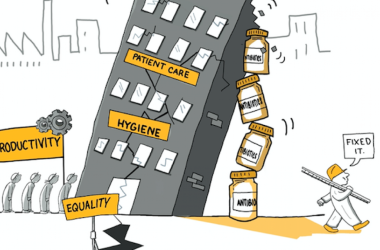Only last year, Mad in Asia Pacific ran Yeni Rosa Damayanti’s photo-essay on the horrific conditions the mentally ill in Indonesia had been abandoned in during and after the 2018 earthquake and tsunami that struck Central Sulawesi. Damayanti, a lead TCI Asia Pacific member from Indonesian Mental Health Association (IMHA) has been working tirelessly to bring to light the terrible human rights violations taking place in her country, the most recent of which come in the wake of the COVID-19 pandemic sweeping across the globe.
[TRIGGER WARNING] Indonesia’s ‘social care institutions’ in these times of pandemic
Indonesia has a system of ‘social care institutions’ that families and communities are given permission to start, in order to incarcerate people with psychosocial disabilities. As the ‘permission’ does not mean regulation, the ‘care’ in these institutions is nonexistent. Widely prevalent in the country, the institutions lack any kind of monitoring or audits; the permission only covers the allowance for initial infrastructure, which can be as small as a 10×6 feet cage at the back of a residence. For a large number of these ‘care’ institutions, their infrastructure stops there. Except often, there is the additional shackle or rope that keeps the caged person bound to the floor or wooden pallet that serves as their bed. Community members with real or perceived psychosocial disabilities often spend years confined thus, in a practice called pasung.
Even though the practice was banned in 1977, this 2016 Human Rights Watch article outlined that 18,800 people lived in pasung in Indonesia according to government data available at the time. Pasung is only one of the forms of abuse that persons with psychosocial disabilities face in the community, mental hospitals, and various other institutions in Indonesia; others include stigma, arbitrary and prolonged detention, involuntary treatment, and physical and sexual violence. People are detained in close proximity to each other in overcrowded facilities with extremely poor hygiene. Many must eat, sleep and defecate in the same place.
Article 11 of the Convention of Rights for People with Psychosocial Disability (UNCPRD), intended to protect those living with psychosocial disability during a state of emergency states: State Parties shall take every action that is needed and guarantees the protection and safety for people with psychosocial disability in any situation of risks, including a situation of armed conflict and in the case of natural disaster in accordance to their obligation under the international law which also includes the international humanitarian law and the international law of human rights.
However, given the institutional conditions even in normal times, and having seen how families and communities rushed to safety during the earthquake, tsunami and liquefaction of 2018, leaving their marginalised members shackled and locked up, it should come as no surprise that these are the invisible and forgotten people in the days and months of the current pandemic. With thousands currently living in subhuman conditions across Indonesia, ignored by the government, these private and governmental ‘care’ institutions risk becoming COVID-19 hotspots, perhaps similar to the ones we reported on recently in Korea.
Residential programmes and long-term care facilities for the disabled in New York City have already surged in the propagation of the virus among their members. Unless strong governmental action is taken up in Indonesia, little is left to the imagination as to what havoc the pandemic will wreak across its ‘social care’ institutions.

